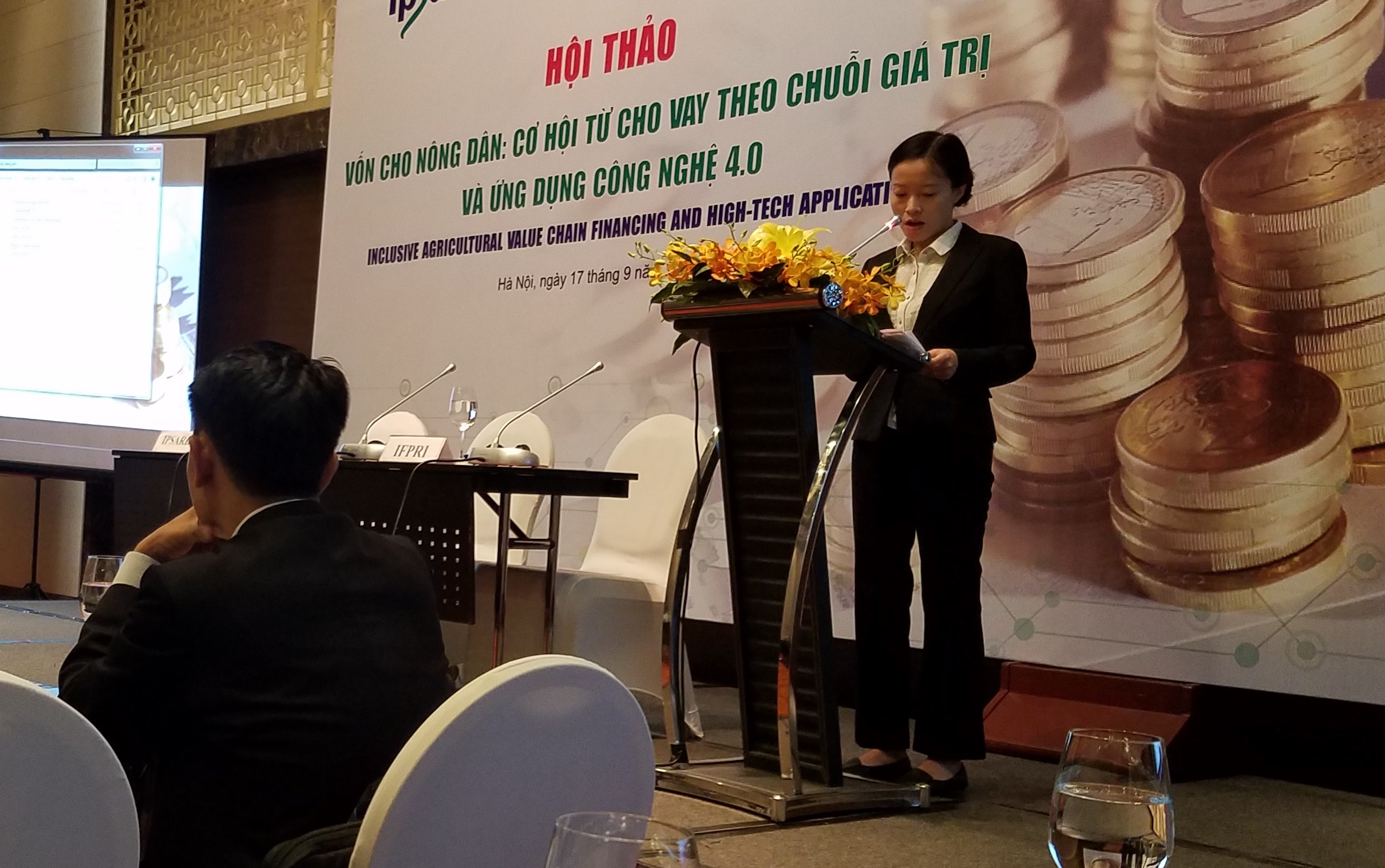Smallholder farmers in developing countries face substantial constraints to boosting production—chief among them a lack of financial services. Smallholders often cannot access the credit necessary to invest in new crops or technologies and to provide security in the face of risks and shocks. A 2013 paper found that in South and Southeast Asia, only 1 percent of smallholders’ credit needs for longer term investments are met. Women, low-income groups, and ethnic minorities may face even larger challenges to meeting their finance needs. Farmers also often lack insurance needed to make risky investments that can also boost their production.
A new four-year IFPRI-led project will examine this challenge in Viet Nam, Indonesia, and Myanmar and recommend policy changes to open up access to credit and financial services. A recent workshop in Hanoi—co-sponsored by the Institute of Policy and Strategy for Agriculture and Rural Development (IPSARD) of Viet Nam—launched the Innovative Financial Services for Agriculture (IFS4Ag) project.
After 30 years of reforms, Viet Nam’s agricultural sector is moving into a transitional stage, IPSARD Director Nguyen Do Anh Tuan said. Production is increasingly large-scale, sophisticated technologies are employed, and linkages in value chains are expanding. Investment is exploding: Around 7,600 businesses currently invest in agriculture, a number that has more than doubled in two years. Unsurprisingly, the demand for capital is urgent, Nguyen said, as is the need for improved credit, public services, and banking policies targeted toward the country’s small farmers.
“Smallholder farmers in Viet Nam still require support to access timely and affordable financing, but more and more aggregators and buyers seem willing to experiment with value chain financing models,” said Tom Moyes, project leader of the Mekong Business Initiative.
IFPRI Senior Research Fellow Alan de Brauw and Rodd Dyer, agribusiness research program manager at the Australian Centre for International Agricultural Research (ACIAR), outlined the IFS4Ag project’s two phases. In the first, the project team will report on the state of value chain finance in each of the three study countries, identyifing opportunities for policy changes to improve finance markets and to extend finance products to smallholder farmers through the use of new products and technologies, such as digital ICTs. These technologies can help to develop new, lower-cost distribution channels for financial products that address the unique needs of farmers.
“The challenge is that though technologies exist, more evidence is necessary to understand what technologies actually help raise incomes among poor farmers,” said Dyer.
In phase two, the project team will conduct rigorous research on potential models of inclusive finance, with an eye toward producing evidence about what models work best for the poor.
In a discussion on rural development and rural finance in Viet Nam, Truong Thi Thu Trang of IPSARD noted that “Access to credit may hinder Viet Nam’s opportunity to continue developing its agricultural industry. Through the use of new technologies, there are important opportunities to make the government’s key commodities more competitive with industry in neighboring countries.” Tran Van Tan, the deputy director of credit for the State Bank of Viet Nam, echoed this message, noting the government’s recent Decree 55 will encourage the use of technology in providing finance to smallholders.
By bringing together key Viet Nam-based stakeholders, the inception workshop “revealed the challenges, but also the broad opportunities that are opening up for commercial agriculture in the country,” Moyes said.
Sara Gustafson is a Communications Specialist with IFPRI’s Markets, Trade and Institutions Division.
The Innovative Financial Services for Agriculture (IFS4Ag) project is a collaborative effort between IFPRI, IPSARD, the Myanmar Economic Association, the Indonesian Center for Agricultural Socio Economic and Policy Studies (ICASEPS), and the University of Sydney. The project is funded by the Australian Centre for International Agricultural Research (ACIAR) with co-financing provided by the CGIAR Research Program on Policies, Institutions, and Markets (PIM).







